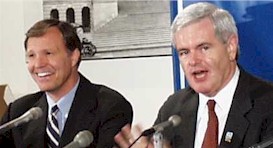
Sen. Wyden
Internet and Tech Bills Become Law
(October 22, 1998) The Senate passed the massive Omnibus Appropriations Bill on Wednesday morning, October 21. The House approved in late on Tuesday. This bill is the vehicle for passage of the Internet Tax Freedom Act (ITFA), Child Online Protection Act (COPA or CDA II), Children's Online Privacy Protection Act, Government Paperwork Elimination Act (digital signatures), and H1B visa bill. The President signed it on Wednesday.
| Internet Tax Freedom Act |
The bill establishes a three year moratorium on new discriminatory state and local taxes on the Internet and Internet access, and creates a commission to study the subject of Internet taxes. It also grandfathers certain existing Internet taxes.
| See, Copy of S 442, as adopted by the Senate on 10/8/98. |
The tax moratorium bill had many sponsors. Its lead sponsor and protagonist in the Senate was Sen. Ron Wyden (D-OR). Rep. Chris Cox (R-CA) lead the House fight for its adoption.
 |
Sen. Wyden |
In the closing weeks of this session, the ITFA was hotly debated, both on the floor of the Senate, and in private negotiations. It was also the subject of many roll calls votes. Sen. Wyden and Sen. John McCain (R-AZ) lead the floor fight and debate.
Opponents of the bill sought to delay and derail the bill, and in the alternative, to weaken it. Some Senators sought unsuccessfully to add amendments that would have required mail order catalogue retailers to collect state and local taxes on the merchandise they sell to out of state purchases, and expanded the scope of the study to be conducted to include all sales and use taxes on remote sales.
And twice, cloture votes had to be held to cut off the use of debate as a delaying tactic.
 |
| Rep. Chris Cox and Speaker Gingrich |
As passed the bill provides for a 19 member Commission, to be be made up of three federal officials (Secretaries of Commerce, Treasury, and the U.S. Trade Representative), eight representatives from business and industry, and eight representatives from state and local governments (one representative would be from a state or local government that does not impose a sales tax).
The bill contains a three year moratorium. The Senate Commerce Committee had reported a bill with a six year moratorium, while the Senate Finance Committee reported a bill with a two year moratorium. The House passed a bill (HR 4105 EH) on June 23 with a three year moratorium. An amendment to extend the moratorium to four years barely failed on a roll call vote of 45 to 52.
The ITFA also includes two amendments pertaining to Internet porn. Sen. Dan Coats (R-IN) offered one amendment that was approved by a vote of 98 to 1. Only Sen. Patrick Leahy (D-VT) voted against. The amendment exempts from the tax moratorium any commercial website engaged in the business of the commercial distribution of material harmful to minors that does not restrict access to such material by children. The ITFA also includes a provision that Internet access providers that do not offer blocking software to their customers are exempted from the tax ban.
| COPA |
The omnibus package also includes the Child Online Protection Act, which bans sending to minors over the web material that is harmful to minors. It is intended to replace the much more broadly worded Communications Decency Act, which was held unconstitutional by the Supreme Court last year.
| Summary of S 1482 and HR 3783, the "Child Online Protection Bill". |
The which passed is HR 3783, sponsored by Rep. Mike Oxley (R-IN). However, it is based on an earlier bill (S 1482) introduced by Sen. Dan Coats (R-IN). Its critics sometimes refer to it as "CDA II," or "Son of CDA." HR 3783 had passed the House Commerce Committee by a unanimous voice vote. It also passed by the House by voice vote.
 |
Rep. Mike Oxley |
The bill will allow websites to distribute pornography, but require those websites which distribute material that is harmful to children to verify adult status through the use of credit cards, adult access codes, adult PIN numbers, or other technologies that may be developed in the future. It employs the "harmful to minor" standard which has been in federal courts.
The bill, while overwhelmingly popular with legislators and voters, it is angrily opposed by liberal civil liberties groups. The American Civil Liberties Union (ACLU), People for the American Way (PFAW), Center for Democracy and Technology (CDT), and other groups, have promised to challenge its constitutionality in federal court.
| H1B Visas |
Another major tech measure contained in the omnibus appropriations bill is the H1B visa bill. The bill will increase the number of H1B temporary worker visas from 65,000 now to 115,000 in 1999, 115,000 in 2000 and 107,500 in 2001. The visa limit would return to 65,000 in 2002.
| See, Summary of H1B Bills. |
Rep. Lamar Smith (T-TX), Chairman of the House Immigration Subcommittee, pushed the House version of the bill (HR 3736), while Sen. Spencer Abraham (R-MI), Chairman of the Senate Immigration Subcommittee, sponsored the Senate version of the bill (S 1723).
 |
Rep. Smith |
The Senate overwhelmingly passed its bill (S 1723) on May 18. House members sought more protections for American workers, and House and Senate leaders negotiated a compromise bill on July 24, 1998. However, the House did not proceed to pass the bill because Bill Clinton threatened to veto it. Clinton later withdrew his objections, and the House passed the compromise bill on September 24.
The bill is designed to relieve a shortage of high-tech professionals in the computer industry. Computer industry executives have strenuously asserted that there is a severe shortage of high-tech workers which is threatening the industry. Labor leaders have denied that any shortage exists.
| Digital Signatures |
The omnibus bill also includes S 2107, the "Government Paperwork Elimination Act." This bill was sponsored by Sen. Spencer Abraham (R-MI). Rep Anna Eshoo (D-CA) was pushing a similar bill in the House.
| See, Summary of Digital Signature Bills, HR 2991 & S 2107. |
The title is a misnomer typical of Congressional bills. The bill requires federal agencies to make online versions of their forms available to the public, and thus may cut down on the use of paperwork. However, its most important feature is that it allows individuals and businesses to use digital signatures to file forms electronically. The legal validity of digital signatures is fundamental to the development of electronic commerce. The bill's primary goal is to advance electronic commerce.
| Children's Online Privacy |
Finally, the omnibus bill also includes S 2326, the "Child Online Privacy Protection Act." It was sponsored by Sen. Richard Bryan (D-NV). It would ban operators of websites and online services that are directed to children from collecting information from children under thirteen without parental consent.
| See, Summary of Child Online Privacy Protection Act, S 2326 and HR 4667. |
The bill does not set forth specifications for this procedure. Rather, it delegates to the Federal Trade Commission the authority to promulgate regulations to enforce this restriction. It also gives the FTC enforcement authority.